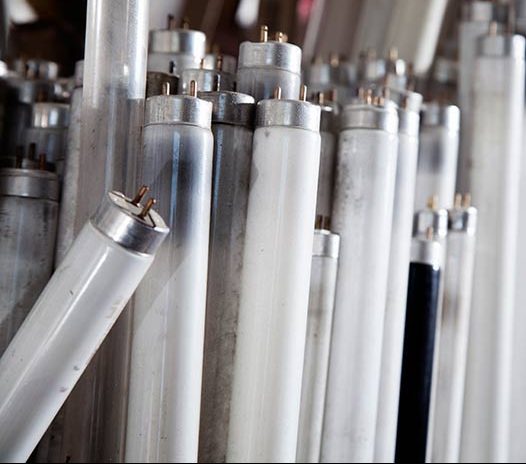
Last updated on September 7th, 2023 at 06:37 pm
Certain categories of hazardous waste are regulated under the U.S. Environmental Protection Agency (EPA) ruling as universal waste. Universal waste, or “UW,” is a category of hazardous waste commonly generated by a wide variety of establishments and is regulated in a manner that promotes recycling, eases the regulatory burden on homeowners and retail stores, and encourages the development of municipal and commercial recycling programs. Keep reading our universal waste guide to learn the different categories and how it applies to lamps and light bulbs.
Universal Waste Categories
There are five types of universal waste defined by Title 40 of the Code of Federal Regulations (CFR) Part 273: batteries, pesticides, mercury-containing devices, lamps or light bulbs, and aerosol cans.
Lamps Regulated As Universal Waste
40 CFR part 273 defines a lamp as any portion of a lighting fixture that produces radiant light. These materials include:
- Fluorescent light bulbs
- High-intensity discharge (HID) light bulbs
- Neon light bulbs
- Mercury vapor light bulbs
- High-pressure sodium light bulbs
- Metal halide light bulbs
- Ballasts (in Maine & Vermont only)
Generation and Storage of UW Lamps
Nearly every home and facility produces universal waste lamps. Households, which are the least regulated, must properly dispose of lamps with their local municipality or recycling center. A small universal waste generator (SUWG) generates less than 200 pieces of universal waste monthly. A large universal waste generator (LUWG) accumulates more than 200 pieces of universal waste a month and they must obtain an EPA ID number.
Lamps, in particular, become a universal waste when they are unusable. Once “burnt,” lamps should be placed in a sturdy, closable box and marked with the date the first lamp was placed inside. From then, the generator should keep the boxes in a locked, secure location.
Disposal & Recycling of Lamps
At the recycling facility, bulbs are sorted by type and crushed. Mercury is pulled from the material and reclaimed, and metals are melted out of the waste for recycling.
Do you need help managing your universal waste? Contact us at Maine Labpack to learn how we can help!
